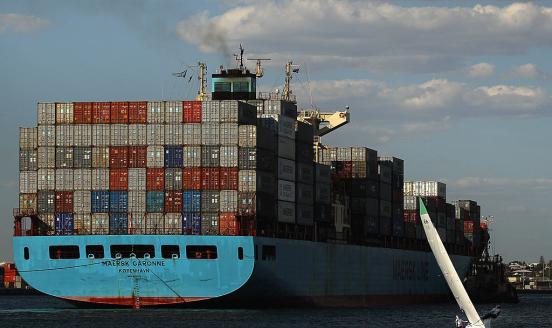Discussion: Can border carbon taxes fit into the global trade regime?
Reinhard Quick – Director Brussels Office of the German Chemical Industry Association, as well as a well-known trade specialist in Brussels and H
Reinhard Quick is the Director of the Brussels Office of the German Chemical Industry Association, as well as a well-known trade specialist in Brussels and Honorary Professor for international economic law at Saarland University. Here he discusses the Bruegel policy brief Can border carbon taxes fit into the global trade regime? with bits authors: Henrik Horn, Non-Resident Scholar at Bruegel, and André Sapir, Senior Fellow at Bruegel. Quick has authored several papers on the topic including The Debate Continues: Are Border Adjustments of Emission Trading Schemes a Means to Protect the Climate or are they ‘Naked’ Protectionism? published in Trade and Competition Law in the EU and Beyond (2011).
I have read with great interest the Bruegel Policy Brief “Can border carbon taxes fit into the global trade regime?” It is a remarkable document showing the difficulties countries face when implementing such measures. I am however quite astonished that after rightly and intensively criticising border carbon taxes, you come to the conclusion that such instruments could nevertheless be put in place. I would have preferred a clear statement recommending that border carbon adjustments (BCAs) not be pursued, since politicians could use or abuse your analysis to justify protectionist measures.
- Reinhard Quick
Many thanks for your careful comments on our Policy Brief. Given our training as trade economists, and experience from actual policy making and from working at the WTO, we are of course very sympathetic to your concern that BCAs will be used for protectionism. Indeed, this concern was the reason why we started working on the issue. At the same time, there is obviously a looming climate problem, which implies that the standard prescription concerning the optimality of free trade might not necessarily hold any more. This does not lead to the immediate conclusion that trade restrictions should be imposed in practice.
Regarding the use politicians could make of our analysis, we disagree. Politicians would not draw on our Brief to defend protectionist measures, but they would find in it arguments to show that although BCAs can be designed in a non-protectionist manner, it would be difficult to do so in practice. There is a vast amount of literature on BCAs in environmental economics - we are aware of at least 200 papers, but there are many, many more - that purports to demonstrate the various benefits (and much more rarely the drawbacks) of using BCAs. These analyses are methodologically as solid as those in the trade field, and therefore cannot be dismissed off-hand.
- Henrik Horn and André Sapir
I have my doubts whether such a system could be construed in a way that is compatible with the World Trade Organization’s (WTO) framework. I tackle this in my article [mentioned above] about the proposal made by some officials in the Commission during the revision of the Emissions Trading System (ETS) scheme, the so-called ‘FAIR’ scheme. I come to the conclusion that ‘FAIR’ would have been an unjustifiable violation of the European Union’s WTO obligation.
- Quick
As economists, our intention was not to argue about the legality of BCAs. We are aware of the fact that some prominent trade lawyers are skeptical about BCAs, but other equally prominent ones hold the opposite view.
- Horn and Sapir
Notwithstanding my job as a lobbyist for an energy-intensive industry, which allegedly could benefit from BCAs, as a trade lawyer I fundamentally disagree with introducing them. You are certainly aware that the Kiel Policy Brief - published by the Kiel Institute for World Economy - argues that border carbon adjustments should not be considered an instrument of choice in international climate policy.
- Quick
We completely agree.
- Horn and Sapir
Your first point, the extraterritorial feature of the system, is a valid one. However, as the WTO’s Appellate Body has stated, as long as the country taking the measure can demonstrate a “sufficient nexus” the argument of an extra-jurisdictional limitation of the Article XX of the General Agreement on Tariff and Trade (GATT) can hardly be made. Would any CO2-emission be enough to establish a sufficient nexus? Or would it be necessary to determine a benchmark for the amount of CO2 considered “sufficient”?
- Quick
We agree of course on the sufficient nexus / USShrimps parallel. But our point is that the arguments for BCAs do not point to any nexus at all. In fact, such arguments typically seem oblivious altogether to the legal requirement for this nexus. It seems to us that the existence of climate externalities creates such a nexus, however. Additionally, we assume that the Appellate Body would be uncomfortable with striking down a BCA, if it is clearly motivated by a climate concern, and that it would instead do something creative to avoid it.
- Horn and Sapir
I find it more challenging to answer the question of whether the measure is ‘necessary’ under GATT Article XX (b) or ‘related’ under GATT Article XX (g). If in spite of implementing a European BCA, the world continues to emit as much or even more CO2 than without the measure, one could probably question whether the basic requirements of Article XX (b) and (g) are met.
- Quick
A strong version of the leakage argument holds that domestic climate policy might worsen the climate, if the leakage problem is severe enough. But it is harder to see how the BCA itself could worsen the problem, economically speaking. With this, we are not trying to deny the problem of defining the limits of the term “necessary” in Art. XX. For instance, does it include the case where a BCA is “necessary” in order to coerce other countries to pursue stricter climate policies?
- Horn and Sapir
It is not likely that the world would accept a multilateral agreement on how border carbon measures could be implemented. Without such an agreement, BCAs will be considered unilateral trade measures and those measures can and will probably be challenged under WTO.
- Quick
Yes, it is of course highly unlikely that there will be sufficient support for such an agreement. But it might not be more utopic than a multilateral climate agreement with some bite.
- Horn and Sapir
I agree with your second point on ‘leakage’. Where in legal terms do we find an environmental justification that we should avoid ‘leakage’? Where is the international reference that a country can take measures to avoid leakage?
According to my understanding, the United Nations Framework Convention on Climate Change (UNFCCC) explicitly accepts leakage because of the notion of common but differentiated responsibilities. The industrialised world has to do more against climate change than the developing world. Again, the fundamental argument against leakage is that it will have no effect on CO2 reduction, unless BCAs are used by a large number of countries.
Given that emerging countries, in particular, have new and old production facilities, a BCA taken only by the EU would just lead to trade diversion. The products fabricated at the high-tech installations would be exported to the EU notwithstanding BCA, and those from dirtier facilities would be exported to the rest of the world. The BCA would, therefore, have no effect on reducing CO2-emissions.
- Quick
We would guess that in the scenario you discuss, the trade diversion would not completely undo the gains in terms of reduced emissions: an EU tax on dirty production would effectively constitute a reduction of global demand for such products, and in turn reduce global production, as long as the supply of this product is not completely inelastic.
- Horn and Sapir
The fundamental issue is not leakage, but who should bear the cost of a domestic regulation. It is internationally understood that the cost of environmental media legislation should be borne by domestic producers and not by importers. There is no convincing environmental argument for allowing adjustments for climate change purposes, when they are still considered illegal for air, water, soil, waste, and installations.
- Quick
We do not believe that “adjustments” are motivated for any policy. It is a different matter, however, to regulate activities with negative externalities. This clearly should be done, if the externalities are large enough, and the policy tools available are sufficiently sharp.
- Horn and Sapir
I disagree with your tariffs analysis. Should tariffs reflect climate externalities and other societal goals? I do not think so. From my understanding of the WTO law, the only purpose of a tariff is the protection of a domestic industry. The WTO does not envisage tariffs to promote societal goals. If that were the case, the WTO would recognise tariff increases for societal purposes. Yet the WTO wants tariffs to be reduced and eventually eliminated.
- Quick
In our view, there is nothing in the WTO that implies that tariffs be imposed for any particular reason - in contrast to some domestic policy instruments. Members negotiate tariff levels without having to defend their political preferences in this regard. The WTO is based on the notion that gradual trade liberalisation is desirable, but it does not require or imply total elimination of tariffs on all products. And from an economic point of view, tariffs can be desirable to promote global efficiency, provided there are distortions that can be at least partly remedied through trade restrictions. Almost all economists agree that in practice the situations where trade barriers would have such effects are rare, especially when taking into consideration that such barriers are likely to be in the interest of protectionism.
- Horn and Sapir
The resolution to an environmental issue can and should not imply tariff increases. How would you then define ‘most polluting products’? Tariffs are applied on a Most Favoured Nation (MFN) basis on products, not taking production processes into account. As far as climate mitigation measures are concerned, they need to be applied as part of the production process and not on products per se.
- Quick
Trade measures are obviously not the best way of tackling climate problems. The only attractive aspect of the “adjustment” notion in BCAs is that they are seen as complements to domestic measures. With regard to how they are levied, the fact that they are production process measures implies they are not taxes on specific products, but on emissions sent out during production.
- Horn and Sapir
Let me give you several examples from the chemical industry – an energy intensive industry. Many of our products are needed for so-called environmental goods, yet the input is probably not as environmentally sound as the end product. You cannot build a wind-turbine, a solar panel, a fuel efficient car, or even a fully electrical car without chemicals. However, the production of these chemicals might be quite energy intensive and therefore negative from a climate change mitigation view.
So what would your choice be? Increasing tariffs on input products needed to produce those goods you want to promote? This idea would go against the promotion of global value chains which both the OECD and the WTO vigorously defend.
- Quick
This is a very telling example of the practical difficulties of designing any type of border measure in a way that it hits where it should. It would have fitted nicely into our Brief!
- Horn and Sapir
If the EU is the only one that applies BCAs and if they work properly, they will benefit domestic industries solely. These measures will therefore be nothing but naked protectionism.
- Quick
A large part of the aforementioned vast literature on BCAs seeks to quantify the effects of BCAs for the EU, for instance. The results are far from conclusive. Some (perhaps most) studies suggest moderate positive effects for the climate. Whether BCAs in practice would be implemented to reap such benefits, or for protectionist motives, is a different issue. If implemented, this would most likely result from interplay between various political interests.



